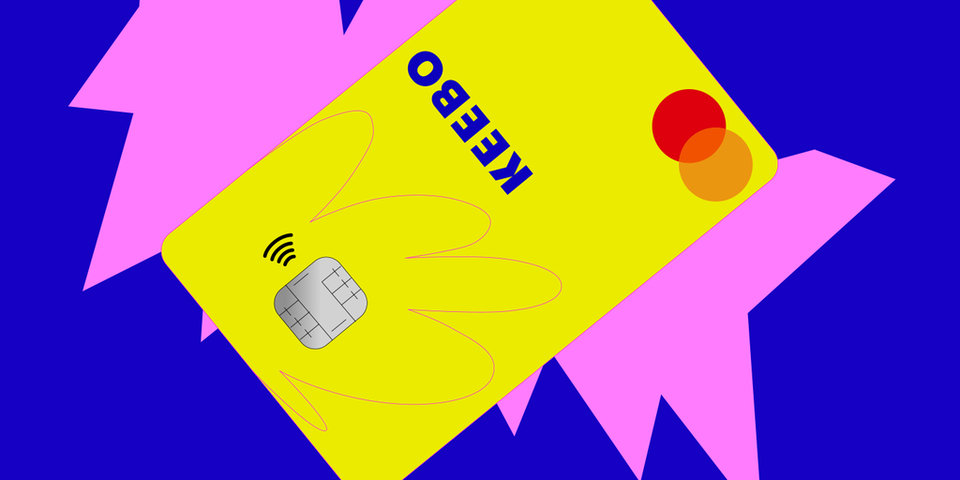Products
Keebo: the UK’s first open banking-powered credit card
The UK is shortly to get its first open banking powered credit card, writes Eric Johansson

Y
oung people, freelancers and expats keep getting rejected by traditional credit cards issuers: Keebo says that it has a solution.
There remain segments of the market that regard traditional credit card issuers with a degree of suspicion. While not taking a credit card protects this small segment of the market from ending up weighed down by unmanageable debts, it also means that such consumers cannot build a credit history and access more important loans such as mortgages further down the line.
“We’re trying to really help these people that have been excluded by giving them access to credit,” Michael Vanaselja, CEO of fintech startup Keebo, tells EPI. Vanaselja and CTO Matthew Hallett founded Keebo in 2019 to help provide bespoke lines of credit to underserved users.

Michael Vanaselja, CEO of fintech startup Keebo
The London-headquartered fintech startup secured a £5m seed equity round in August. Connect Ventures, which has backed open banking startup Truelayer in the past, was one of the investors supporting the raise.
As is normal, Keebo says it will use the new cash to fund further development of its services and expanding its team. But the fintech will also use the money to officially launch its first product – the UK’s first Financial Conduct Authority (FCA) approved open banking-powered credit card, intended for people who have so far been denied these services – later this month.
“There are millions of people in the UK and globally who are potentially responsible borrowers, but are just lacking access to credit,” says Vanaselja.
The question is whether the startup can widen access to consumer credit without putting people’s financial health at risk or triggering action by market watchdogs who are scrutinising credit card companies intensely.
Open banking to the rescue
Keebo claims it can accomplish this by using an open banking underwriting solution. The model enables the startup to tap into the data streams of other financial services providers, provided customers have consented. In essence, this is what open banking really is: it should only be necessary to get a customer’s consent to find out their past history, rather than also having to get the permission of their previous bankers, lenders etc.
Keebo says it can provide customers with a snapshot of how creditworthy they are by looking at things like having previously set up direct debits and actually paid them, how much money they have saved and if they are using buy-now-pay-later (BNPL) solutions.
The startup founder believes this will enable Keebo to avoid the risk of customers over-extending multiple lines of credit, whether that’s by using the services of traditional lenders, BNPL providers or anyone else.
“Because we can see that, that then goes into our affordability calculation of how much credit we would actually give a customer,” Vanaselja says. “This is a really important point for us, making sure that we don’t overburden customers.”
The open banking underwriting model also warns users if they are about to overextend themselves financially.
Vanaselja suggests that this is something many credit card providers and BNPL providers can’t see, arguing they risk putting users at financial health at risk.
However, it should be noted that some BNPL providers, such as Zilch, perform soft credit checks before approving transactions.
Victims of their own success
Ebanx was certainly off to a good start, with the CEO claiming that it has “been profitable since Day One.”
However, as the number of merchants using the service grew, Del Valle began to worry. He had reason to. The more transactions that flowed through Ebanx, the bigger the threat of criminals using the platform became.
At the beginning, however, the founders didn’t consider that risk as a main priority. Instead, they were focused on ensuring merchants were actually using their services.
And they did. Online merchants faced massive demand and believed Ebanx could provide the solution to meet that demand, an impression the company did little to dispel.
“They were demanding a service level from us [akin to] a large payment provider and we were just like five people in the south of Brazil,” Del Valle remembers.
Initially he’d enjoyed the feeling of seeing the number of transactions grow in tandem with the merchants signing up to their services. And then the fraud attacks started.
“There was a day when we saw a huge spike and we were all excited about the traffic,” the Ebanx CEO recalls. “[We thought] people were selling a lot, that we were going to get rich, because it’s so many transactions. And then [after] a couple of days, we realised that it was all fraud.”
Recognising the severity of the problem, the founding team took a more cautious look at the transactions processed by their systems. What that meant was that one single employee was put to manually check each transaction for telltale signs of fraud.
Understandably, that slowed down the approval rate of transactions considerably, especially as the number of payments made via Ebanx kept growing at the same time. To meet the demand and not fall foul of the risk of the company being used for financial crimes, the company developed a platform to automatically do the job of that single employee.
Since then the anti-fraud engine has grown to tackle 50 types of payment solutions across the 15 Latin American nations Ebanx operates in. By leveraging machine learning and internal analytics to detect fraud patterns and conduct identity checks of users, the engine can now detect and prevent criminals from using Ebanx to defraud their victims and launder their dirty money, Del Valle claims.
Why Keebo wants to provide credit
Apart from the obvious fact that the company wants to make money out of its customers, Vanaselja believes the service is something that is sorely needed by young people and other underserved customers.
“Credit cards are really powerful tools because they give you access to buy things that you wouldn’t normally be able to afford if you were just using a debit card,” Vanaselja says. “But they’re also powerful tools for the future in terms of improving your credit, building your credit score and getting things like a mortgage or your first-time home.”
And it seems as if people are eager to sign up to Keebo’s new credit card.
“We have close to 1000 people who have signed up to the waitlist and it’s growing really quickly,” he concludes.